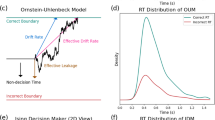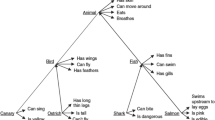Summary
A mathematical formalization of cognitive processes based on concepts previously given in Experientia1 is presented. Cognitive processes are described as a set of exponentially decaying interaction probabilities determined by previous interactions between different elements and an association parameter, the inverse of the cognitive stability. The interactions occur in a ‘cognitive string’ surrounded by a ‘cognitive plasma’ which carries the contextual information. The ‘complexity’ of a cognitive process is proportional to time.
Similar content being viewed by others
References
Cervén, E., Experientia41 (1985) 713.
Vester, F., Denken, Lernen, Vergessen. Was geht in unserem Kopf vor? Wie lernt das Gehirn? Wann lässt es uns im Stich? Deutsche Verlagsanstalt, Stuttgart 1975.
Author information
Authors and Affiliations
Rights and permissions
About this article
Cite this article
Cervén, E. A mathematical approach to cognitive processes. Experientia 43, 562–568 (1987). https://doi.org/10.1007/BF02143586
Published:
Issue Date:
DOI: https://doi.org/10.1007/BF02143586




